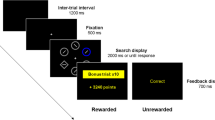Abstract
Several different arrangements have been described for increasing the response requirements for reinforcement using the label progressive-ratio schedule. Under the original progressive-ratio schedule, the response requirement is increased after each reinforcer. Subsequently, arrangements have been used in which the number of required responses increases following multiple reinforcers at a single response requirement or between sessions. Following an assessment of the different types of contingencies that result from such progressive response requirements and the labels used to describe them, a set of descriptive labels is suggested for these different types of progressively increasing response requirements.
Similar content being viewed by others
References
Baer, D. M. (1960). Escape and avoidance response of pre-school children to two schedules of reinforcement withdrawal. Journal of the Experimental Analysis of Behavior, 3, 155–159.
Baron, A., Mikorski, J., & Shlund, M. (1992). Reinforcement magnitude and pausing on progressive-ratio schedules. Journal of the Experimental Analysis of Behavior, 58, 377–388.
D’Andrea, T. (1971). Avoidance of timeout from response-independent reinforcement. Journal of the Experimental Analysis of Behavior, 15, 319–325.
Dardano, J. F. (1973). Self-imposed timeouts under increasing response requirements. Journal of the Experimental Analysis of Behavior, 19, 269–287.
Dardano, J. F. (1974). Response-produced timeouts under a progressive-ratio schedule with a punished reset option. Journal of the Experimental Analysis of Behavior, 22, 103–113.
DeFulio, A., & Hackenberg, T. D. (2007). Discriminated timeout-avoidance in pigeons: The roles of added stimuli. Journal of the Experimental Analysis of Behavior, 88, 51–71.
Dougherty, D. M., Cherek, D. R., & Roache, J. D. (1994). The effects of smoked marijuana on progressive-interval schedule performance in humans. Journal of the Experimental Analysis of Behavior, 62, 73–87.
Ferster, C. B., & Skinner, B. F. (1957). Schedules of reinforcement Acton, MA: Copley.
Findley, J. D. (1958). Preference and switching under concurrent scheduling. Journal of the Experimental Analysis of Behavior, 1, 123–144.
Foster, T. M., Temple, W., Cameron, B., & Poling, A. (1997). Demand curves for food in hens: Similarity under fixed-ratio and progressive-ratio schedules. Behavioural Processe, 39, 177–185.
Griffiths, R. R., Findley, J. D., Brady, J. V., Dolan-Gutcher, K., & Robinson, R. W. (1975). Comparison of progressive-ratio performance maintained by cocaine, meth-ylphenidate and secobarbital. Psychopharmacologia, 43, 81–83.
Hodos, W. (1961). Progressive ratio as a measure of reward strength. Science, 134, 943–944.
Hodos, W. (1965). Motivational properties of long durations of rewarding brain stimulation. Journal of Comparative and Physiological Psychology, 59, 219–224.
Hodos, W., & Kalman, G. (1963). Effects of increment size and reinforcer volume on progressive ratio performance. Journal of the Experimental Analysis of Behavior, 6, 387–392.
Hurwitz, H. M., & Harzem, P. (1968). Progressive ratio performance with reset option. The Psychological Record, 18, 553–558.
Johnson, M. W., & Bickel, W. K. (2006). Replacing relative reinforcing efficacy with behavioral economic demand curves. Journal of the Experimental Analysis of Behavior, 85, 73–93.
Killeen, P. R., Posadas-Sanchez, D., Johansen, E. B., & Thrailkill, E. A. (2009). Progressive ratio schedules of reinforcement. Journal of Experimental Psychology: Animal Behavior Processe, 35, 35–50.
Lattal, K. A., Reilly, M. P., & Kohn, J. P. (1998). Response persistence under ratio and interval reinforcement schedules. Journal of the Experimental Analysis of Behavior, 70, 165–183.
Leinenweber, A., Nietzel, S. M., & Baron, A. (1996). Temporal control by progressive-interval schedules of reinforcement. Journal of the Experimental Analysis of Behavior, 66, 311–326.
Li, N., He, S., Parrish, C., Delich, J., & Grasing, K. (2003). Differences in morphine and cocaine reinforcement under fixed and progressive ratio schedules: Effects of extinction, reacquisition and schedule design. Behavioural Pharmacology, 14, 619–630.
Madden, G. J., Smethells, J. R., Ewan, E. E., & Hursh, S. R. (2007). Tests of behavioral-economic assessments of relative reinforcer efficacy: II. Economic complements. Journal of the Experimental Analysis of Behavior, 88, 355–367.
Perone, M., & Courtney, K. (1992). Fixed-ratio pausing: Joint effects of past reinforcer magnitude and stimuli correlated with upcoming magnitude. Journal of the Experimental Analysis of Behavior, 57, 33–46.
Reilly, M. P., & Lattal, K. A. (2004). Within-session delay-of-reinforcement gradients. Journal of the Experimental Analysis of Behavior, 82, 21–35.
Roane, H. S., Lerman, D. C., & Vorndran, C. M. (2001). Assessing reinforcers under progressive schedule requirements. Journal of Applied Behavior Analysi, 34, 145–167.
Stafford, D., & Branch, M. N. (1998). Effects of step size and break-point criterion on progressive-ratio performance. Journal of the Experimental Analysis of Behavior, 70, 123–138.
Stafford, D., LeSage, M. G., & Glowa, J. R. (1998). Progressive-ratio schedules of drug delivery in the analysis of drug self administration: A review. Psychopharmacology, 139, 169–184.
Stafford, D., LeSage, M. G., & Glowa, J. R. (1999). Effects of phentermine on responding maintained by progressive-ratio schedules of cocaine and food delivery in rhesus monkeys. Behavioural Pharmocology, 10, 775–784.
Terrace, H. S. (1963). Discrimination learning with and without “errors.” Journal of the Experimental Analysis of Behavior, 6, 1–27.
Timberlake, W. (1984). A temporal limit on the effect of future food on current performance in an analogue of foraging and welfare. Journal of the Experimental Analysis of Behavior, 41, 117–124.
Author information
Authors and Affiliations
Corresponding author
Additional information
An earlier version of this material was presented at the 10th annual meeting of the Maryland Association for Behavior Analysis, Baltimore, 2007.
Rights and permissions
About this article
Cite this article
Jarmolowicz, D.P., Lattal, K.A. On distinguishing progressively increasing response requirements for reinforcement. BEHAV ANALYST 33, 119–125 (2010). https://doi.org/10.1007/BF03392207
Published:
Issue Date:
DOI: https://doi.org/10.1007/BF03392207




